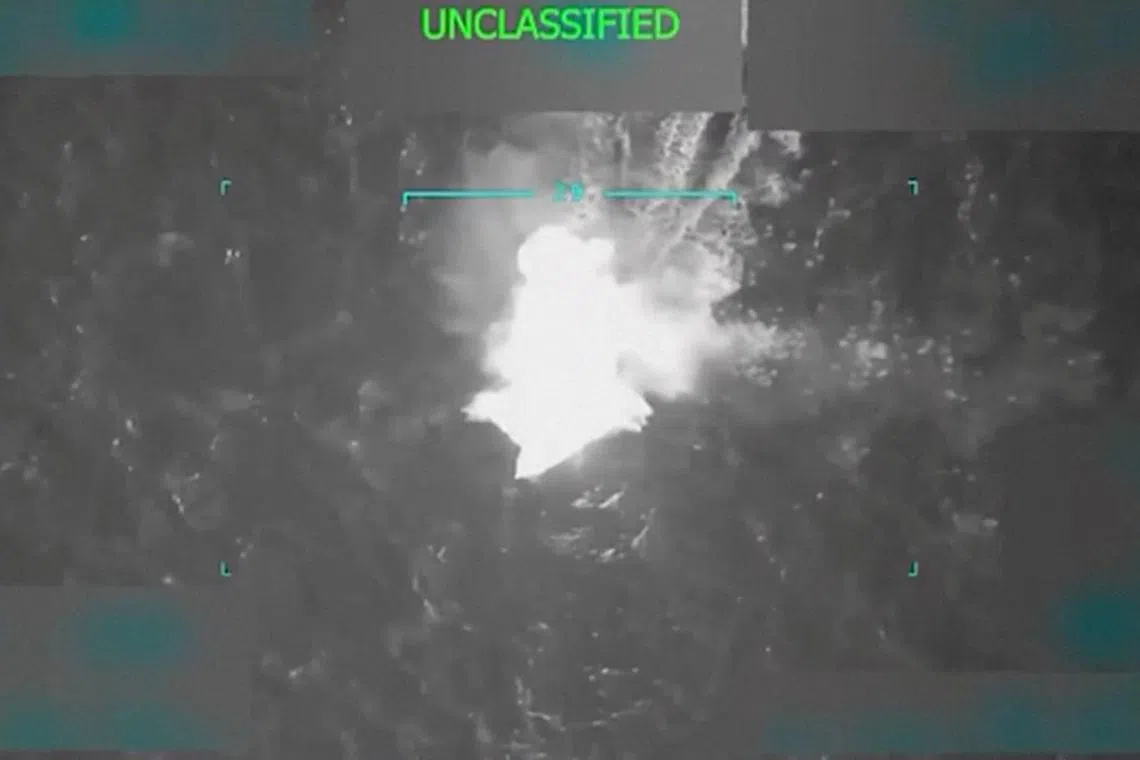Pentagon chief suggests more operations against cartels coming
Sign up now: Get ST's newsletters delivered to your inbox

A still image from a video shared on social media by US President Donald Trump is said to show an attack on a boat leaving Venezuela that is allegedly carrying illegal narcotics.
PHOTO: REUTERS
Follow topic:
- US Defence Secretary Hegseth affirms continued military operations against cartels after a deadly strike killing 11 on a Venezuelan vessel.
- Questions arise regarding legal justification and details of the strike, with concerns about violating international law, according to Mary Ellen O'Connell.
- The US military presence increases in the Caribbean, targeting drug trafficking, while Venezuela denies the activity of Tren de Aragua.
AI generated
WASHINGTON - US Defence Secretary Pete Hegseth said on Sept 3 that military operations against cartels would continue, setting the stage for a sustained military campaign in Latin America even as basic questions about a deadly strike against a vessel from Venezuela remained unanswered.
The US military killed 11 people on Sept 2 in a strike on a vessel from Venezuela
Little is known about the strike, including what legal justification was used or what drugs were on board, but Mr Hegseth said operations would continue.
“We’ve got assets in the air, assets in the water, assets on ships, because this is a deadly serious mission for us, and it won’t stop with just this strike,” Mr Hegseth said on Fox News.
“Anyone else trafficking in those waters who we know is a designated narco terrorist will face the same fate,” Mr Hegseth said.
He declined to provide details on how the operation was carried out, saying they were classified. It is unknown whether the vessel was destroyed using a drone, torpedo, or by some other means.
After the Sept 2 strike, Mr Trump said the US military had identified the crew as members of Venezuelan gang Tren de Aragua, which the United States designated a terrorist group in February.
The Pentagon has not released specifics about the crew and why it chose to kill those on board.
Presidents of both major US parties have in the past, asserted the authority to use the military for limited strikes when there is a threat to the United States, as Mr Trump did in June when he ordered an attack on Iran.
But it is unclear what legal authority Mr Trump used in this case.
Mary Ellen O’Connell, an expert on international law and the use of force with the University of Notre Dame, said the Sept 2 operation “violated fundamental principles of international law”.
“The alleged fact that the attack was on the high seas is irrelevant. What is relevant is that the US had no right to intentionally kill these suspects,” she said.
Maduro ‘should be worried’
The decision to blow up a suspected drug vessel passing through the Caribbean, instead of seizing the vessel and apprehending its crew, is highly unusual and evokes memories of the US fight against militant groups such as Al-Qaeda.
The United States has deployed warships in the southern Caribbean in recent weeks, with the aim of following through on a pledge by Mr Trump to crack down on drug cartels.
Seven US warships, along with one nuclear-powered fast attack submarine, are either in the region or expected to be there soon, carrying more than 4,500 sailors and Marines.
US Marines and sailors from the 22nd Marine Expeditionary Unit have been carrying out amphibious training and flight operations in southern Puerto Rico.
Asked about Venezuela's close relationship with China, Mr Hegseth took aim at Venezuelan President Nicolas Maduro.
“The only person that should be worried is Nicolas Maduro, who is... effectively a kingpin of a drug narco state,” Mr Hegseth said.
The Trump administration's singling out of Mr Maduro has raised alarm in Caracas that the government might be the real target.
In August, the US doubled its reward
Venezuelan officials have repeatedly said Tren de Aragua is no longer active in their country after they dismantled it during a prison raid in 2023.
Mr Trump shared a video on his Truth Social platform on Sept 2 that appeared to show footage from overhead drones of a speedboat at sea exploding and then on fire in the Sept 2 operation.
Venezuela Communications Minister Freddy Nanez suggested in a post on social media that the video shared by Mr Trump was created with artificial intelligence.
Reuters conducted initial checks on the video, including a review of its visual elements using a manipulation detection tool that did not show evidence of manipulation.
However, thorough verification is an ongoing process, and Reuters will continue to review the footage as more information becomes available. REUTERS

